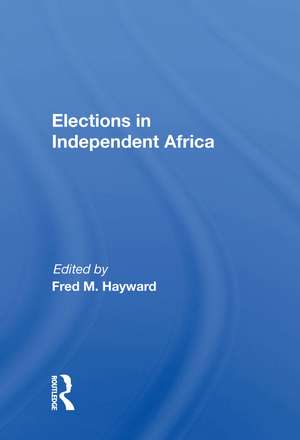Elections in Independent Africa
Editat de Fred M. Haywarden Limba Engleză Hardback – 22 iul 2019
Preț: 770.09 lei
Preț vechi: 1030.86 lei
-25% Nou
Puncte Express: 1155
Preț estimativ în valută:
147.49€ • 151.95$ • 123.55£
147.49€ • 151.95$ • 123.55£
Carte tipărită la comandă
Livrare economică 24 februarie-10 martie
Preluare comenzi: 021 569.72.76
Specificații
ISBN-13: 9780367008819
ISBN-10: 0367008815
Pagini: 336
Dimensiuni: 152 x 229 mm
Greutate: 0.78 kg
Ediția:1
Editura: Taylor & Francis
Colecția Routledge
Locul publicării:Oxford, United Kingdom
ISBN-10: 0367008815
Pagini: 336
Dimensiuni: 152 x 229 mm
Greutate: 0.78 kg
Ediția:1
Editura: Taylor & Francis
Colecția Routledge
Locul publicării:Oxford, United Kingdom
Cuprins
Preface -- Introduction -- Perspectives on Twenty-Five Years of Elections in Sierra Leone -- The Anomalies of Continuity: Perspectives on Ghanaian Elections Since Independence -- Elections and Democracy in Nigeria -- Elections in Botswana: Institutionalization of a New System of Legitimacy -- Single-Party Competitive Elections in Tanzania -- Elections in Zaire: The Shadows of Democracy -- The Electoral Process and Peasant-State Relations in Kenya -- Persistence and Change in Senegalese Electoral Processes -- Conclusions
Descriere
The electoral process has been an integral part of the political landscape of independent Africa for more than a quarter-century and has roots going back to traditional African societies. An examination of the independence period demonstrates the rich diversity of forms, experiences, and meanings of elections in Africa. For some observers, elections are a clear example of multiple failures in Africa—the failure of democracy and institutional transfer and the breakdown of much of the African political process in general. The authors of this book argue that elections in Africa have played a much more significant role than has commonly been recognized; that in spite of problems, elections are an important part of African contemporary political life. It has been too easy to dismiss elections in Africa as irrelevant because there are fewer today than there were two decades ago or because they have frequently failed to conform to democratic norms. However, in a period in which the primary trends of government are toward exclusion, African elections provide one of the few instruments of political action open to civil society. This study of the electoral process suggests a number of themes and conclusions about the relationship of the electoral process to state power and institutions, elite competition, mass participation, legitimacy and its limits, ethnic conflict, mobilization, party competition, authoritarian regimes, the growing incidence of electoral violence, and mass support for democratic values. Fred M. Hayward's substantive introduction discusses the electoral process in general. Eight case studies of key African countries then illustrate the varied meanings and implications of elections in independent Africa, and in the final chapter Hayward draws conclusions about the role and impact of elections. It is clear that although electoral processes have demonstrated a certain fragility, both the form and the process have shown remarkable resilience. This book suggests that there is a need to rethink conventional assumptions about elections, making use of a broader base of experience and meanings.
